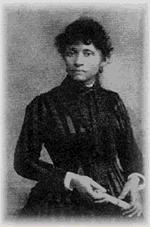

|
Lucy Parsons, Chicago Revolutionary: Who was Lucy Parsons? Her memory has vanished over the past six decades. But in the 1920s and '30s, the Chicago Police Department described her as "more dangerous than a thousand rioters." You cannot know Lucy Parsons and what she became without understanding the city she came to. In 1873, Chicago was a city of misery for tens of thousands of immigrant workers brought in to be used as machines and cast aside. Members of the Chicago Citizens Association who conducted an investigation of how these immigrants lived were sickened by what they saw -- children picking through the garbage and animal litter from the meatpacking plants, scrounging for things to sell. The children were often racked with illness. Fifty percent never reached age five. Families lived in tiny, dirty shacks without windows, floors or toilets. Houses built for six or seven often housed 30 or 40 people. There were thousands of hungry children unable to go to school because the family needed them to work. The Chicago economic establishment was either uncaring or downright hostile toward the immigrants. The relief fund for the poor, for instance, was taken over by Marshall Field. Field used it for his own business investments for rebuilding after the Chicago fire. "When a tramp asks you for bread," the Chicago Tribune advised, "put strychnine or arsenic on it and he will trouble you no more." Shortly thereafter, the Illinois National Guard was formed to suppress poor people who were organizing and striking for better working conditions. The threat of revolution was in the air! Lucy Parsons, a feeling, caring black woman, became, in this atmosphere of fear and want, a political person. Her private life and personal desires faded before the strength of her total belief in justice for the poor. Albert Parsons, once a Confederate soldier, married Lucy after the Civil War and became a believer in the social equality of the races. Having fled the South under threats from the Klan, he was soon a leader in organizing the poor. Albert Parsons was targeted for death by city leaders. A bomb was thrown at police during the Haymarket riot. Although Albert Parsons was not even present, he was indicted and convicted for his alleged participation. Police Captain John Bonfield, a brutal thug, had led the charge on the gathering of workers and evidence suggests that he may have been involved in the bomb-throwing. Albert Parsons was hanged along with the other Haymarket martyrs. As the Haymarket "trial" unfolded, Lucy Parsons' belief in justice and in the necessity for revolution was confirmed. It seemed irrefutable that Chicago was incapable of showing justice for its working class. What was most striking about this heretofore forgotten heroine was the depth of her courage. Lucy Parsons was undaunted by physical abuse by the police, undeterred by vile threats from thugs, or by malicious lies in the Chicago newspapers. She cried in despair over the dead body of her husband Albert in 1886. After that, she never shed another tear. Lucy preached justice for the poor by way of revolution. She was forceful and convincing. The most powerful men in the city - Field, Armour, Pullman, etc. - made a concerted effort to silence her. For the next 50 years, in blatant disregard of her rights, she was arrested wherever she spoke. Lucy Parsons led a Christmas Day march to 18th and Prairie Avenue where marchers showered the Field mansion with catcalls and rotten tomatoes. Soon after, Field moved his family to the North Shore -- near the new Fort Sheridan which was built to protect the rich from the poor. Neither city officials, police abuse, years of gnawing poverty and hunger nor blindness in her later years reduced Lucy Parsons' enthusiasm for the cause, for the welfare of the workers. Lucy Parsons was not a feminist. She would have rejected the idea that she stood for women's causes, just as she denied she stood for black causes. Blacks are oppressed, she believed, because they are poor. Lucy was not complicated - she was totally dedicated to a new society. She was a strong, penniless warrior for the poor. She lived for 90 years and died without regrets for having fought the Chicago establishment tooth and nail for over 60 years. When Lucy Parsons died, the police seized and destroyed her letters, writings and library. And so she has virtually disappeared from our memory. Information for this story comes from the book, Lucy Parsons: American Revolutionary, by Carolyn Ashbaugh. This article originated in the PEOPLE'S TRIBUNE (Online Edition), Vol. 22 No. 7 / February 13, 1995; P.O. Box 3524, Chicago, IL 60654, pt@noc.org Source: |